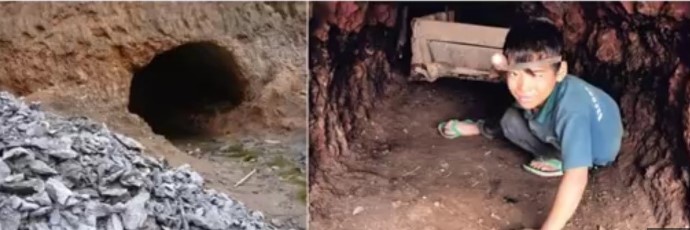Context:
Recently, a commission headed by Justice (retired) Brojendra Prasad Katakey related to the rat-hole mining issue has voiced concerns about the slow restoration rate of environmental damage caused by rat-hole coal mining.
Rat-Hole Mining
- It is a primitive and hazardous method of mining, which Involves digging narrow, horizontal tunnels just large enough for a person to crawl through. These tunnels resemble the burrows made by rats, hence the name “rat-hole mining.”
- Workers, often children, enter these tunnels and manually extract coal using basic tools like pickaxes and shovels.
Impacts:
- Safety hazards: The tunnels are highly unstable and prone to collapses, which can trap and kill miners.
- Environmental damage: Deforestation and soil erosion are common consequences. Water sources can also be polluted.
- Health problems: Miners face respiratory problems due to coal dust inhalation. They also risk injuries from cramped working conditions and accidents.
About the Panel:
- A one-member panel (Justice (retired) Brojendra Prasad Katakey) was appointed by the High Court of Meghalaya in 2022 to handle coal-related issues by rat-hole coal mining in the State.
- The panel was mandated to include advising the Meghalaya government on complying with directives from the Supreme Court and the National Green Tribunal (NGT), both of which prohibited hazardous rat-hole coal mining in April 2014.
Key Findings of report:
- Environmental Damage: The committee noted a lack of significant progress in restoring the environment damaged by rat-hole coal mining, emphasizing the urgent need for remediation efforts.
- Fund Utilization: Despite the existence of the Meghalaya Environment Protection and Restoration Fund (MEPRF), the committee highlighted its non-utilization for restoration activities.
- Abandoned Pits Closure: The committee emphasized the necessity of closing abandoned pits in the state to mitigate ongoing environmental hazards.
- Community Impact: Communities residing around the mines continue to suffer due to ongoing acid mine drainage from unclosed pits, highlighting the human impact of the mining activities.
Recommendations:
- Drone Survey: The committee recommended the immediate commencement of a drone survey after the completion of coal transportation to identify and assess illegally mined coal post-NGT ban.
- Legal Action: It advised the seizure of illegally mined coal under the provisions of the Mines and Minerals (Development and Regulation) Act, 1957, to ensure accountability and deter future violations.
Ongoing Actions:
- Community Engagement: Continued engagement with affected communities and stakeholders to address concerns and gather input for remediation efforts.
- Regulatory Compliance: Ensuring ongoing compliance with directives from the Supreme Court and NGT regarding coal mining activities to prevent further environmental degradation.
- However, the practice persists due to a lack of stringent enforcement and economic desperation in some communities.

